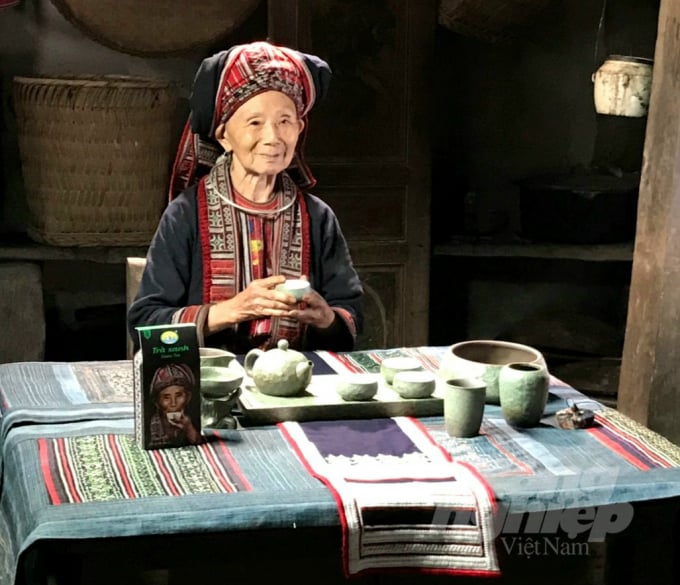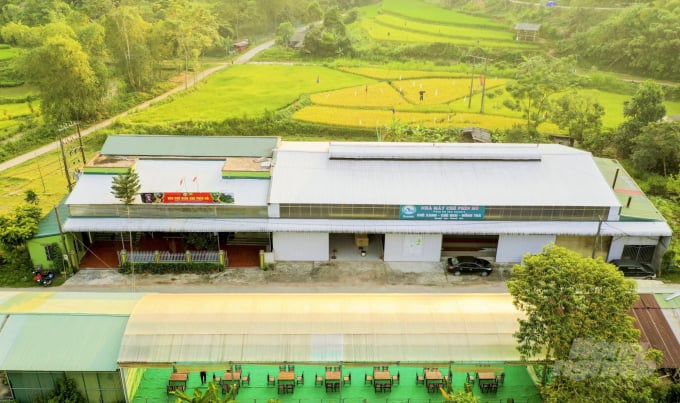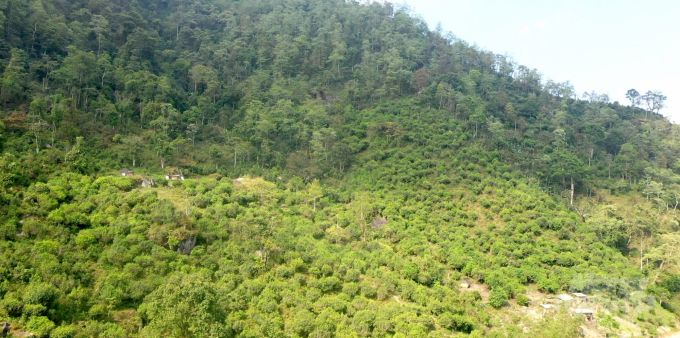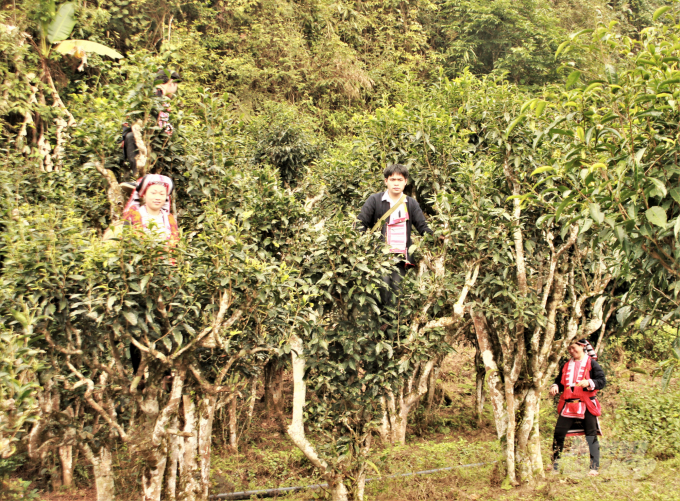May 24, 2025 | 11:01 GMT +7
May 24, 2025 | 11:01 GMT +7
Hotline: 0913.378.918
May 24, 2025 | 11:01 GMT +7
Hotline: 0913.378.918

Ms. Trieu Mui Nghinh, the face of Phin Ho tea products. Photo: DT.
The house of Mrs. Trieu Mui Nghinh - the old woman selected to represent the brand of 5-star OCOP Phin Ho tea of Phin Ho tea cooperative - lies in Phin Ho valley, Thong Nguyen commune, Hoang Su Phi district, Ha Giang under the canopy of Shan Tuyet tea plants in the ancient forest. She is turning 93 years old this year, but her eyes are still keen; when she brings the cups of tea to her lips, the tip of her tongue can still taste the delicious tea and smell the attractive aroma.
Ms. Nghinh has been making tea for as long as she could remember, so just by touching the tea buds and smelling the scent, she can tell if it's the best bud for the best tea. Then comes the stage of cooking, she watches the fire turn red to place each batch of tea into the cast iron pan, using her hands to feel the heat and the fire to achieve the desired taste; all these efforts are to create an addictive tea flavor, reminding the tea enjoyer of its unique origin.
Ms. Nghinh's house has 2 hectares of shan Tuyet tea, with some reaching 300 years old. Ms. Nghinh said that the Red Dao people in Phin Ho knew about the tea culture since the ancient times. In the past, tea was used by Red Dao people to welcome friends and sometimes sold for money, but the price was not considerable.

The ancient Shan Tuyet tea plants give the locals better livelihood. Photo: Dao Thanh.
1 kg of the specialty tea can help her exchange for a lot of rice that can last Ms. Nghinh's family for many months. The ancient tea plants also "granted" her and other villagers many buffaloes, cows, televisions; even a motorbike to travel around the village. These motorbikes are faster than her feet climbing the slopes and hills, outmatching the strength of the buffaloes and cows. Thanks to these motorbikes, her hometown delicious tea products can conveniently reach the urban life.
I asked for the reasoning behind their choice of an old lady instead of a beautiful young girl to represent Phin Ho tea product. Members of the cooperative all explained that, Ms. Nghinh not only represents the characteristic aura of the Phin Ho Red Dao people; her tea knowledge and lovely life with her husband, children, and village are also precious details to be respected and honored, just like how the Red Dao people in Phin Ho cherish their hometown Shan Tuyet tea plants.
In Phin Ho village, there are 5 women named Muong. One of them is Ly Muong, Deputy Director of Phin Ho Tea Cooperative. According to the elders of Phin Ho, a girl named Muong is usually a girl who was not born in the village or on the day of her birth, a guest from another ethnic group visited her house.
Another meaning for the name Muong is that it's a name of another ethnic group, representing the parents' wish is that the baby girl will be graceful in Red Dao village as well as in other villages and ethnic groups; hoping that she would lead a life worth remembering by the villagers.
Ly Muong's parents explained that she was given this name because on the day of her birth, her family welcomed two Kinh guests to their house to offer a water generator. True to her parents' expectations, the girl born in 1991 has shown great signs of cleverness from her childhood, with eyes able to detect delicious tea buds.

The production and processing factory of Phin Ho tea cooperative. Photo: Dao Thanh.
After finishing high school, Muong was the first girl from the Dao village to pass the entrance exam to a university. After graduating from the Chemistry Major of Thai Nguyen Pedagogical University, Muong returned to her hometown to settle down and became a member of Phin Ho tea cooperative. In 2018, Muong was elected as the Deputy Director with the trust of her villagers. Villagers and members of the cooperative said that Muong has a beautiful voice like a mountain bird singing, easy for villagers to understand. Muong has the agility of a forest squirrel; she is knowledgeable, travels a lot, so as a deputy director of the cooperative, people in the village felt more supported.
While many houses in Phin Ho did not have a phone signal, Muong knew how to set up a facebook fan page for the cooperative; a zalo group for convenient communication. There has since been many facebook pages, strangers from the South contacted to order tea. There are also foreign guests.
Ly Muong shared, her house also has 2 hectares of tea fields, each year producing nearly 6 quintals of tea. Similar to the people of Phin Ho village and the Hoang Su Phi tea region, Shan Tuyet tea plant is closely associated with the life of each Red Dao family in Phin Ho, so each local usually does not use any fertilizer or chemicals for the plants; When the grass grows tall, they use cut the grass with a knife, so the tea has a distinctive natural flavor and aroma, favored by customers.
Head of Hoang Su District Department of Agriculture and Rural Development, Ly Choi Nhan, also native to Phin Ho Red Dao village, said that thanks to people like Ly Muong and members of Phin Ho tea cooperative, their efforts have helped the ancient Shan Tuyet tea becomes more valuable and known by many people.

Phin Ho tea region with newly planted areas. Photo: DT.
The tea crops have nurtured the lives of many boys and girls in Phin Ho village. Men and women grow up, get married, get old and laid to rest on the hillside. The ancient Shan Tuyet tea plants remain there, standing tall against the wind, rain and storms, becoming the soul and culture of the Red Dao village.
The peak of Phin Ho mountain, at about 1,300m high, is the first place to welcome the sun in Dao village. Thanks to the cool and cloudy climate all year round, the tea grown here has large buds, covered with a layer of silky and snow-white fluff.
The Dao people in Phin Ho believe that Shan Tuyet tea is a precious natural medicine. Because shan tea when drunk brings a feeling of refreshment, helps to clear the mind, eliminates toxins, purifies the body, fights skin aging and especially, helps prevent Arthritis, cardiovascular diseases, reduces risk of cancer, etc.
Hoang Su Phi district currently has about 4,600 hectares of ancient Shan Tuyet tea. There are usually four harvests of shan tea a year. The most delicious crop, with the highest value and quality is that of the early spring. This is after when the shan tea has experienced a cold winter; and the first tea buds begin to burst into the morning dew.

Phin Ho tea is the first agricultural product from Ha Giang province to be recognized as a 5-star OCOP product. Photo: DT.
Around May and June, when it's sunny, the yield is high because of the available water. That's also when the biggest harvest of the year takes place. Around August is the next autumn crop and October, November is the last tea harvest of the year.
The quintessence of heaven and earth are gathered into each tea leaf, blended following the secrets of the Red Dao people into green tea, black tea, fairy tea, red tea, and white tea bearing the Phin Ho tea cooperative brand. All products of the cooperative are certified by the Control Union Certifications as natural organic products according to European standards. They are gradually integrating into the global market.
In June 2021, Phin Ho tea processing cooperative has 2 tea products recognized as 5-star OCOP product, including: Green tea products (100g box) and Red tea (100g box). These are the first 2 products from Ha Giang province to be recognized as 5-star OCOP products.
Translated by Nguyen Hai Long

(VAN) The People's Committee of Tra Vinh province has approved an adjustment to the investment policy for the Green Hydrogen Plant project, increasing its area to approximately 52.76 hectares.
![Reducing emissions from rice fields: [2] Farmers’ commitment to the soil](https://t.ex-cdn.com/nongnghiepmoitruong.vn/608w/files/news/2025/05/05/dsc08881jpg-nongnghiep-140632.jpg)
(VAN) Clean rice cultivation model in Thuong Tan commune, Bac Tan Uyen district, is assisting local residents in achieving sustainable agriculture by substantially reducing costs, increasing productivity, and protecting the environment.

(VAN) At the conference to disseminate Resolution No. 68, AgriS introduced its digital agricultural ecosystem and reaffirmed its commitment to accompanying the Government in promoting private sector development and sustainable agriculture.

(VAN) 'Blue Ocean - Blue Foods' initiative is designed to restore marine ecosystems and establish sustainable livelihoods for local communities by cultivating a minimum of 1,000 hectares of cottonii seaweed in the first three years.
/2025/05/21/4642-3-112707_603.jpg)
(VAN) The V-SCOPE project has made direct contributions to three out of six pillars of the Comprehensive Strategic Partnership between Vietnam and Australia.

(VAN) Facing the threat of rabies spreading to the community, Gia Lai province urgently carries out measures to vaccinate dogs and cats on a large scale.

(VAN) Disease-free livestock farming not only protects livestock herds but also stabilizes production and livelihoods for many farmers in Tuyen Quang.